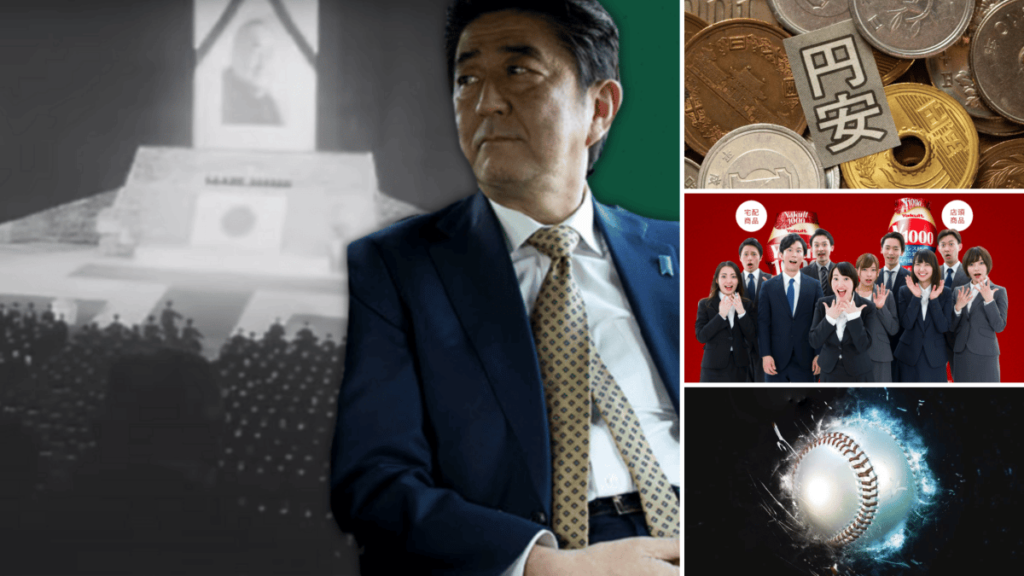[ad_1]
Educational publishing brand U-CAN has once again released its list of hot new buzzwords in Japan for the year. The U-CAN list aims to capture the hottest trending topics in Japan in the last year by tracking newly coined words, popular expressions, or outright dad jokes that popped up in social media and traditional news.
Regular readers know I love tracking the U-CAN list. Last year’s list brought us such hits as the parental lottery (親ガチャ), ussee wa, and gender equality (ジェンダー平等).
So what did 2022 offer us? U-CAN announced a slate of 30 words earlier this year. From those, it selected one grand prize winner as well as a top 10. Without any further ado, let’s look at what made the list – and why[1].
The Terrible Weak Yen (悪い円安; warui enyasu)

The big economic story of 2022 was Japan’s ever-weakening yen. It hit 152 yen to the US dollar at one point – a 24-year low. The plummet meant good news for companies who saw swift demand for their products from overseas. But it spelled trouble for consumers, who saw prices soar domestically.
Yakult 1000

Yakult has been a go-to health staple in Japan ever since scientist Shirota Minoru isolated the bifidobacteria strain that would bear his name. But Yakult kicked it up a notch this year when it introduced Yakult 1000, which packs 100 billion units of Shirota strain. Yakult says it’s seen evidence that the high levels of Shirota could be effective in regulating stress and sleep. Consumers agreed – the product flew off shelves and became nearly impossible to buy. Prospective buyers took to social media to share information on where to procure the elusive elixir.
Smart Phone Shoulder (スマホショルダー)

The latest trendy fashion accessory: a strap for shouldering your smartphone so it’s always easily accessible. Popular among women in Japan, the “smartphone shoulder” is another symbol of how indispensable the device has become to our daily lives.
Take the closest (てまえどり; temae-dori)
Food loss is a worldwide problem. Every year, merchants discard millions of tons of food that expires before sale. Thanks to the work of activists and journalists, more people are aware of the problem and are doing their part to pitch in.
This year, a number of public institutions and private NGOs banded together to promote the concept of temae-dori, or taking (toru) the goods closest to you on the shelf (temae). The concept encourages consumers who are buying perishable food for immediate use to take the items that are set to expire.
Not that I know but… (しらんけど; shiran kedo)
Every language has expressions that speakers can use to soft-pedal their own opinions. This year, a regional expression in Kansai, shiran kedo, escaped its geographical confines and became a go-to expression across Japan. Shiran is the shortened version of shiranai (don’t know, from shiru). Kedo (but) is often suffixed to expressions as a sort of ellipsis, a way to trail off a sentence and express doubt as to what should come next. Taken all together, it carries a sense of “Not that I’d know” or “not that I’m some sort of expert”.
Second generation believers (宗教2世; shukyo nisei)
The assassination of former Prime Minister Abe Shinzo put a spotlight on the Unification Church, a South Korea-based new religious movement that’s worked overtime to ingratiate itself with Japan’s ruling Liberal Democratic Party. The public hasn’t been satisfied with Prime Minister Kishida Fumio’s commitment to cleaning house; his poll numbers are tanking as a result.
Abe’s assassin claims he committed the heinous act because the Church, to which his mother belongs, seduced his family into bankruptcy. That’s brought attention to the children of true believers and the impact the religion has had on their lives.
State Funeral (国葬儀; kokusogi)

Abe’s rule as Japan’s longest-serving Prime Minister was steeped in controversy. So it’s little surprise that his death was as well. Prime Minister Kishida added to the controversy when he announced the country would hold a state funeral for the slain leader. The expensive sendoff evenly divided the Japanese public. The majority objected, not to honoring Abe per se, but to spending so much in public funds during a time when many in Japan are financially struggling. (See “weak yen” above.)
By the time the funeral rolled around, a majority in Japan opposed it. However, in true LDP fashion, the event proceeded as planned, oblivious to public opinion.
Fox Dance (きつねダンス; kitsune dansu)
Remember the song “The Fox (What Does the Fox Say?)” by YIvis? Japan certainly does! The Nippon Hamu Fighters Girls, the cheerleaders for the pro baseball team of the same name, made the song a national sensation with a dance performed in conjunction with the team’s mascot, Frep the Fox. The dance quickly became a fan favorite, with many fans dancing along in the stands to support their team.
Kyiv (キーウ; kiu)
The big international story of 2022 was Russia’s invasion of Ukraine. But the war for Ukraine wasn’t just fought in the streets – it was also fought in the press. As part of his effort to drum up international support, President Volodymyr Zelenskyy asked the world to change the spelling and pronunciation of the nation’s capital from the Russian Kiev to the Ukrainian Kyiv. In Japanese, this meant changing the spelling from キエフ (kiefu) to キーウ (kiu). Japan’s government obliged – and also provided aid and diplomatic assistance to Ukraine in its existential struggle.
The Grand Prize Winner: Murakami-sama (村神様)

Okay, so I generally love the U-CAN awards. However, one sadly predictable facet of this custom is that the “top prize” generally goes to a sports-related expression. In 2021, the winner was Sho-time, a pun on the name of Los Angeles Angels pitcher Otani Shohei. In 2019, it was “One Team”, a celebration of Japan’s surprise success in the Rugby World Cup. (2020’s “3密” was a welcome deviation.)
There’s nothing wrong with that – it just happens not to be my cup of tea. It’s also not a subject that particularly rouses my passions.
On the other hand, I do love a good dad joke. And this year’s winner is pun-tastic. This year, baseball player Murakami Muketaka (村上宗隆) made history when he broke the season home run record previously held by Oh Sadaharu. Murakami hit an impressive 56 homers. The 22-year-old has also racked up an impressive number of other stats in his short but fiery five-year career. So no wonder fans decided to switch out the kami in his name (上) for the kami meaning “god” (神).
What to read next
What Japan’s Hot New Buzzwords of 2021 Tell Us
Sources
[1] ユーキャン新語・流行語大賞. Jiyukokuminsha
[ad_2]
Source link



